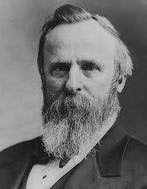
Rutherford B. Hayes (R - Ohio, October 4, 1822 – January 17, 1893) became the nineteenth U.S. president in 1877 after a bitterly contested election that pitted him against Democrat Samuel J. Tilden of New York. Tilden won the popular vote, but disputed electoral ballots from four states prompted Congress to create a special electoral commission to decide the election's result. The fifteen-man commission of congressmen, senators, and Supreme Court justices, eight of whom were Republicans, voted along party lines to decide the election in Hayes' favor. The electoral dispute has come to be known as the Tilden-Hayes Affair. Because of the tension surrounding this partisan decision, Hayes secretly took the oath of office in the White House Red Room. He was the first president to be sworn in at the residence.
As president, Hayes promptly fulfilled the promise he had secretly made to Democrats during the electoral dispute: that he would withdraw Federal troops from those states that they still occupied in the former Confederacy, thus formally ending the Reconstruction era. This action eased acceptance of Hayes' presidency among Southern Democrats and strengthened the rising spirit of postwar reconciliation among white Americans. It did so, however, at a severe cost to Southern African Americans, who, in the absence of the protection and governing oversight the troops had effected, quickly found their civil rights abolished by the white majority and their position in society fixed by the massive racial oppression of the Jim Crow era. It would be many decades, until the Civil Rights Movement of the twentieth century, before African Americans in the South succeeded in breaking the forces of Southern white supremacy—whose triumph the secret compromise of 1877 ensured.
Among Hayes' achievements as president were his work to restore confidence in government in the wake of the corruption-riddled Grant administration, his leadership on civil service reform, and his signing of the bill that allowed women attorneys to appear before the U.S. Supreme Court. Hayes was also the first president to host the "Easter Egg Roll" for children on the White House Lawn. His wife, Lucy Ware Webb Hayes, with whom he had eight children, was the first president's wife with a college degree and the first president's wife to be known as the nation's "First Lady."
Although his presidency restored confidence in the Republican Party, Rutherford B. Hayes refused to run for reelection. He left the White House in 1881, devoting his retirement to humanitarian prison reform and—perhaps ironically, considering the circumstances of his accession to the presidency—to creating educational opportunities for black youth in the South. Hayes died in 1893 at his Spiegel Grove estate in Fremont, Ohio.
Among Hayes' achievements as president were his work to restore confidence in government in the wake of the corruption-riddled Grant administration, his leadership on civil service reform, and his signing of the bill that allowed women attorneys to appear before the U.S. Supreme Court. Hayes was also the first president to host the "Easter Egg Roll" for children on the White House Lawn. His wife, Lucy Ware Webb Hayes, with whom he had eight children, was the first president's wife with a college degree and the first president's wife to be known as the nation's "First Lady."
Although his presidency restored confidence in the Republican Party, Rutherford B. Hayes refused to run for reelection. He left the White House in 1881, devoting his retirement to humanitarian prison reform and—perhaps ironically, considering the circumstances of his accession to the presidency—to creating educational opportunities for black youth in the South. Hayes died in 1893 at his Spiegel Grove estate in Fremont, Ohio.
More.

1 comment:
Back then, Republicans were the liberals.
Post a Comment